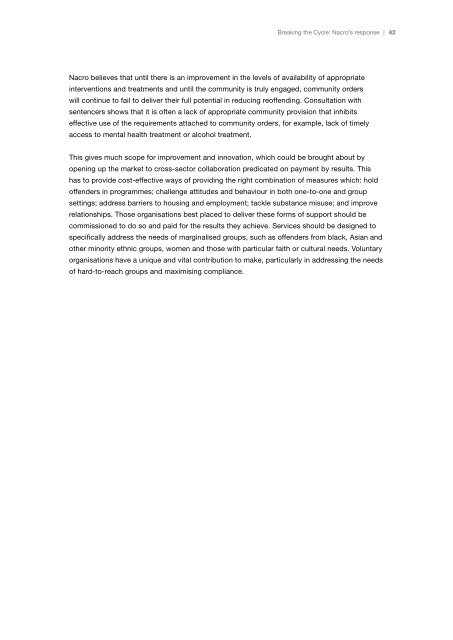Nacro's response to Breaking the Cycle Green Paper
Nacro's response to Breaking the Cycle Green Paper
Nacro's response to Breaking the Cycle Green Paper
You also want an ePaper? Increase the reach of your titles
YUMPU automatically turns print PDFs into web optimized ePapers that Google loves.
<strong>Breaking</strong> <strong>the</strong> <strong>Cycle</strong>: Nacro’s <strong>response</strong> | 42Nacro believes that until <strong>the</strong>re is an improvement in <strong>the</strong> levels of availability of appropriateinterventions and treatments and until <strong>the</strong> community is truly engaged, community orderswill continue <strong>to</strong> fail <strong>to</strong> deliver <strong>the</strong>ir full potential in reducing reoffending. Consultation withsentencers shows that it is often a lack of appropriate community provision that inhibitseffective use of <strong>the</strong> requirements attached <strong>to</strong> community orders, for example, lack of timelyaccess <strong>to</strong> mental health treatment or alcohol treatment.This gives much scope for improvement and innovation, which could be brought about byopening up <strong>the</strong> market <strong>to</strong> cross-sec<strong>to</strong>r collaboration predicated on payment by results. Thishas <strong>to</strong> provide cost-effective ways of providing <strong>the</strong> right combination of measures which: holdoffenders in programmes; challenge attitudes and behaviour in both one-<strong>to</strong>-one and groupsettings; address barriers <strong>to</strong> housing and employment; tackle substance misuse; and improverelationships. Those organisations best placed <strong>to</strong> deliver <strong>the</strong>se forms of support should becommissioned <strong>to</strong> do so and paid for <strong>the</strong> results <strong>the</strong>y achieve. Services should be designed <strong>to</strong>specifically address <strong>the</strong> needs of marginalised groups, such as offenders from black, Asian ando<strong>the</strong>r minority ethnic groups, women and those with particular faith or cultural needs. Voluntaryorganisations have a unique and vital contribution <strong>to</strong> make, particularly in addressing <strong>the</strong> needsof hard-<strong>to</strong>-reach groups and maximising compliance.
















